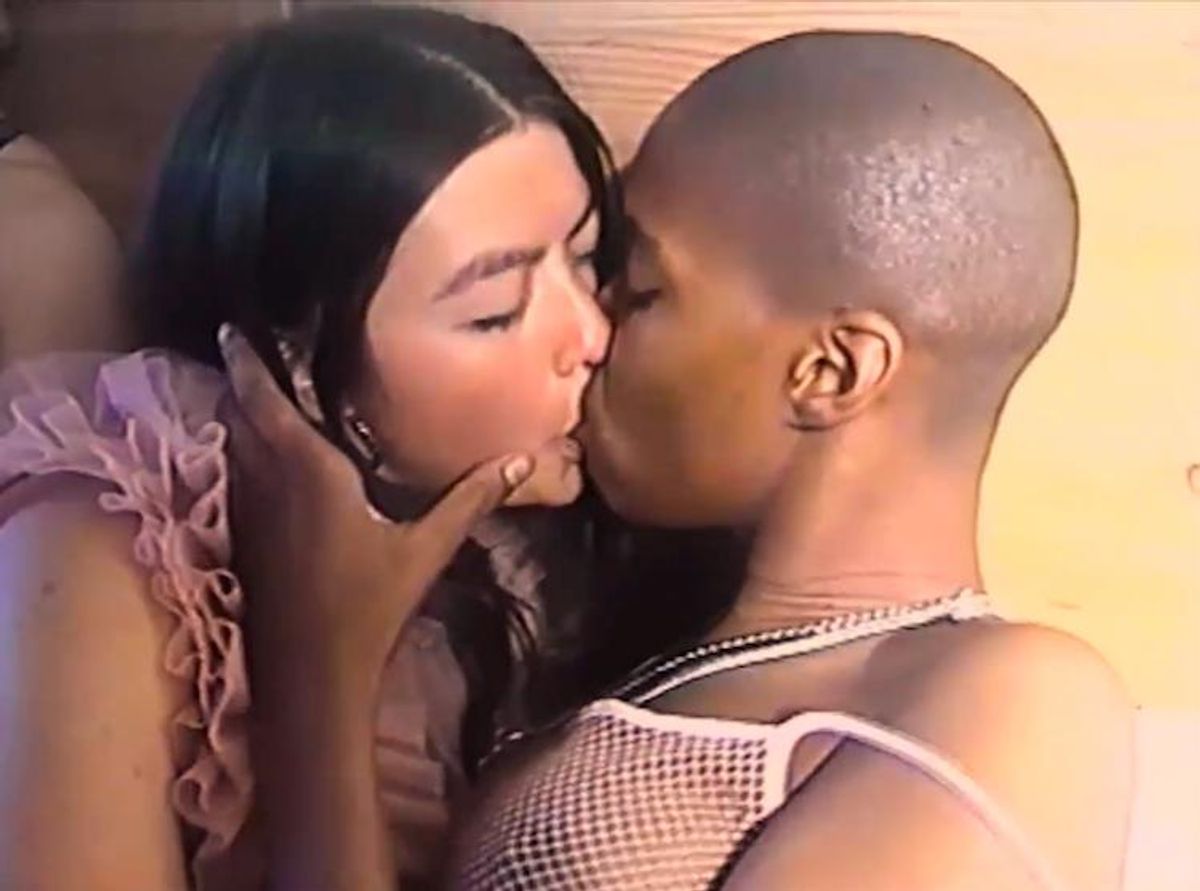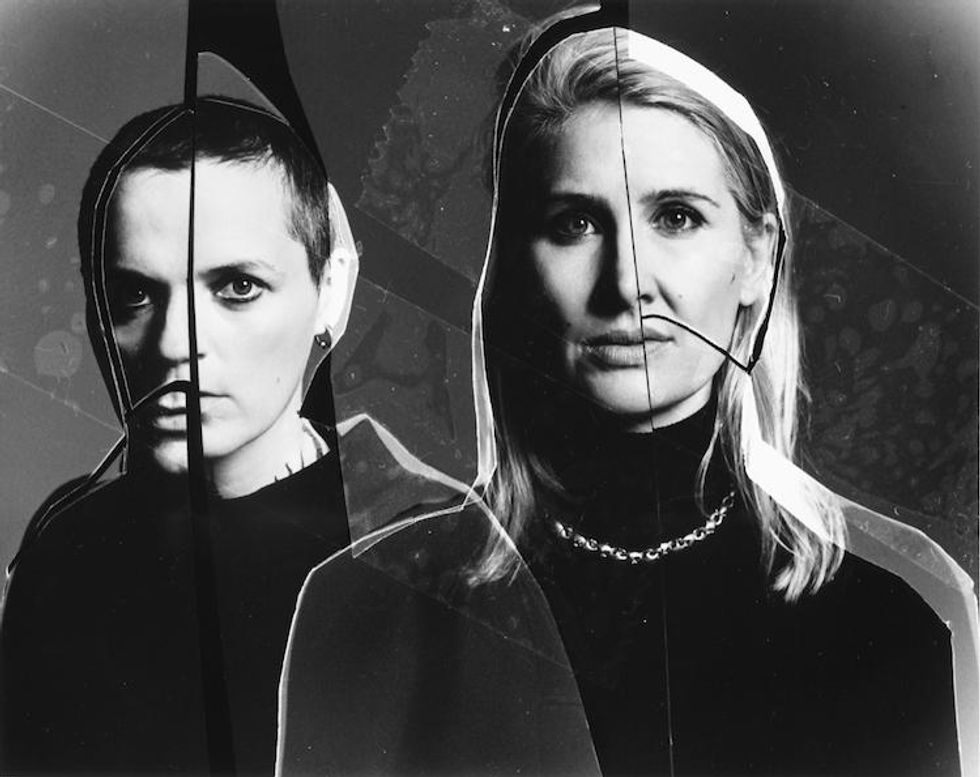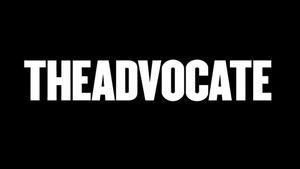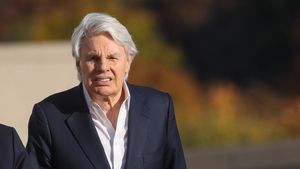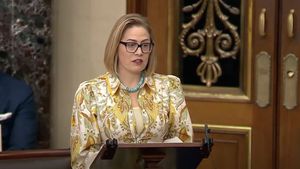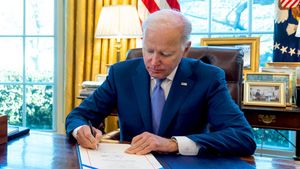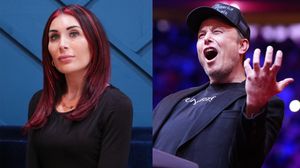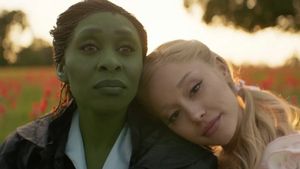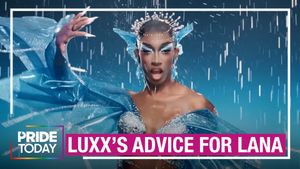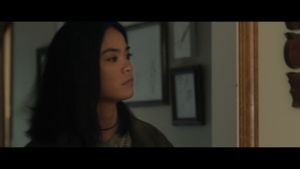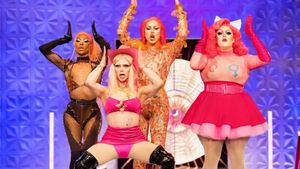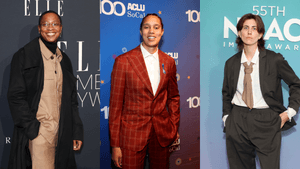Julie Chance and Jane Arnison are dismantling the myth of "lesbian bed death" one squirt at a time. "It's absolutely ridiculous," Jane says of the term used to describe the idea that lesbians have less sex than any other type of couple. "It feels like another patriarchal, misogynistic way of denying women their sexual freedom -- particularly when men aren't invited in. When it isn't about a man or the male gaze."
Inside their flat tucked off one of the cobblestoned streets of Berlin, the patriarchal, misogynistic world seems far away, albeit temporarily. Instead, the duo who perform as the band Evvol exude a calm, playful energy as their dogs dart between our feet and we sit down to dive into "Release Me," their first single since 2016's Physical L.U.V EP.
Co-directed by Julie andfilmmaker Matt Lambert, produced by his husband Jannis Birsner, and styled by Larissa Bechtold, the very NSFW video (see the uncensored version here) feels as much like a clapback to the "Age of the Twink" narrative as it does a declaration of carefree queer womanhood.
Related | Matt Lambert's Short Film, Flower, Finds Intimacy in Sex & Friendship
To celebrate Evvol's return to music and their summer squirt anthem, we caught up Julie, Jane, and Matt to talk about how it all came together, the female gaze, and finding the vulnerability in intimacy.
OUT: You've known each other for years. How did you end up making the video?
Julie Chance: We toyed around with the idea a few years ago and I'm always slagging him because he's obviously obsessed with the cock, so I said he needs to come to the dark side and do something that's only dykes. We came up with this idea where we wanted to represent queer women like ourselves and portray something we don't see every day in the media.
Matt Lambert: Budget was tight so we had to come up with something that was really raw and pure and simple. It was a lot of half-ideas back and forth for months and then we found a weekend and said let's fucking do it.
Did you feel like a big party when you were filming?
Jane Arnison: Yeah! The energy was set really well and the people on board were amazing. Of course, Matt's a brilliant director so the vibe was set from the start. It was serious work with good vibes at the beginning but as the day progressed -- and on the second day -- it descended into a party, which was perfect.
Matt: It definitely wasn't staged to a certain extent but we absolutely constructed the world that is in the video. Saying that, once this world was created, things happened pretty organically. It's a blurry line between fiction and documentary.
I asked Julie to co-direct it with me because I wanted to be really conscious about not hijacking a narrative that wasn't directly my own but also to be mentored by someone who understood the dynamics of queer female relationships more than I did. We were both shooting simultaneously and I'd be further away zoomed in and she'd be in the mix. It was a nice dynamic because we could play different roles as a directing unit.
Julie: I had a vision and I didn't really sleep for a full week before we shot it because I was nervous about what the chemistry would be like and if we'd capture what we want to capture. Stuff like that. On the day of filming, everyone went above and beyond our expectations and we definitely captured that energy on film.
Your new four-track album comes two years after Physical L.U.V. Tell me about the project you worked on in between albums for Berlin's Pop Kulture Festival.
Jane: At the time, there was a mass migration from Syria and there was social backlash from that with conservative Germans. There was a lot going on with that and Trump and what was happening in Australia with the detention center. We felt very overwhelmed by everything and pop music just... the songs didn't feel right. We focused on this piece for a year instead.
Julie: It was this big audio-video installation. We'd done things like this before but not in a public sphere and it was very gratifying.
Jane: Yeah and we had these songs almost ready to go but then decided to wait until it felt right and it feels right now.
You rarely see music videos that are sexy that aren't focused on just queer or gay men. How did it feel to put this on film?
Jane: It felt a bit scary but also exciting to do this. When you feel afraid, you know you're doing something right and that's how I felt about it.
Julie: I felt emboldened and empowered by it. I mean, we're not recreating the wheel or anything but we wanted to do it a certain way and it turned out the way we envisioned it.
It's definitely not reinventing the wheel but it does feel important and revolutionary in some ways. It shouldn't because these things happen every day but in the male-dominated music industry, it's powerful.
Jane: Definitely. We're putting our energy into the lineage of queer female representation that has gone before us and frankly there hasn't been enough of that representation. We're making sure that our community gets the airspace and bandwidth we deserve.
Julie: I think in the video, it really comes across that it's a female gaze. It's playful and not all about fucking or this or that. It is what it is and there isn't a focus on sex or any one thing.
Jane: That was an important part of telling our story. The fact that it's not some dark, dank thing that happens in dark corners. It's just sex. Get over it. It was quite important to come at it from that angle.

Photography: Wilkosz & Way
Matt, how did it feel to focus on queer women?
Matt: I've shot heterosexuality before and I've been with girls in the past when I was younger but it was interesting to see the differences. When you're shooting in the moment, of course, you want it to look sexy and you're conscious of that but there's a difference between being aware that something is sexy and being aroused. When I'm shooting something like Flower, I was very conscious of how to make something feel authentically sexy but I'm also not turned on by it to a point where I can't work. It's about finding a way to film these people in the most human way possible and reflect vulnerability and strength. It's about finding that intersection that makes people feel raw and honest.
It'll be nice to have the video out in the world for everyone who is mystified about what queer women do.
Julie: (Laughs) I hope it gives a bit of an insight. When we talk about gay sex, the gay man is represented quite well in pop culture.
Jane: I mean, lesbians are known for lesbian bed death, which is a term used to describe women in lesbian relationships having less sex than any other type of couple. That's absolutely ridiculous. It feels like another patriarchal, misogynistic way of denying women their sexual freedom -- particularly when men aren't invited in. When it isn't about a man or the male gaze.
Matt, looking back on your film work, it feels a bit like a queer female version of what you'd done with your short film Flower.
Matt: There are definitely a lot of references to my past work in the video. Even early Berlin stuff too like this tiny film called Paul and Jacob a long time ago. It was a lot of pseudo-documentary work that I'd done in the past in Berlin but always about male youth.
In the last couple years, you get to a point where it's not boring but you feel that you've scratched a lot of surfaces when it comes to your own autobiographical narratives of revisiting your youth. It's not only more exciting but just about time to explore more narratives that aren't as directly connected to your own experience.
What was one of the biggest differences you noticed between this particular video and work like Flower?
Matt: It's interesting because, with Flower, men in general in my experience tend to be more performative in the way that they function sexually. When we did Flower, we worked with trained porn actors so there was some time spent unlearning the ways they perform for their camera. Even if someone has never been shot for an X-rated film, they know how they're supposed to look on camera and guys get very performative. What was nice about shooting with the girls is that they seem to be much less performative and more empathetically focused on the pleasure of the other person. It was never about how they were looking as they held a pose. It was about whether their partner was enjoying themselves. There was no ego in the room whereas when you shoot guys, there's always some sort of ego. It was really cool to see how vulnerable they allowed themselves to be.
It's interesting listening to the new track compared to the songs on your 2015 album Eternalism. That was a bit darker and more moody and wintery. This new song feels a lot more like a summer track. Was that intentional?
Julie: It just happened that way. The songs were written around the time of all of these cultural shifts so we focused on how you write songs in such times of trouble and upheaval. A lot of the songs have a dark undertone and I think that's cool -- that was intentional.
Jane: That's a good point. Lyrically, it's very dark but in these troubled times, we didn't just want to sit in the depression of it all.
Julie: Yeah, in Berlin you go to a protest or a demonstration and then you get off your cake at Berghain. There are different types of action and escapism and that's what we tried to convey in these songs.
You've both lived in Berlin for quite a long time. How has the city impacted your artistry?
Jane: It's allowed me to learn to become a master of my craft because I've had time. That's important because being able to be playful and try things out is something you don't always get the opportunity to do. The other part of it for me is that because Berlin is rebellious, it's allowed me to be confident in my political voice.
Julie: Also, just generally being inspired by all of the great musicians who have passed through the city -- obviously Bowie and Iggy Pop. I was quite obsessed with all of that when I first moved here. As Jane said too, the biggest thing is just time. Being allowed to breathe and not have to work a 9 to 5 job.
Jane: (Laughs) Woo! That's something that is really taken for granted. It's not appreciated how important it is for artists to make mistakes. You have to be able to explore.
